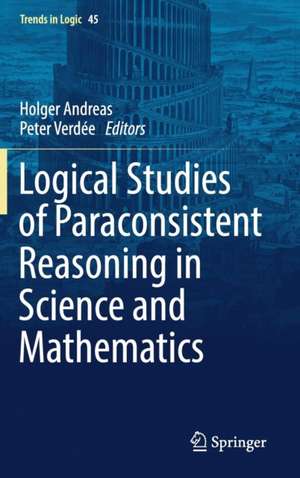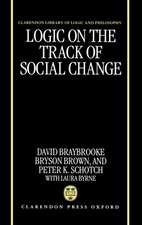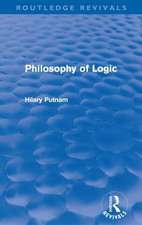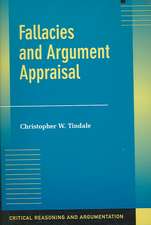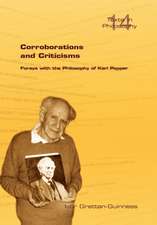Logical Studies of Paraconsistent Reasoning in Science and Mathematics: Trends in Logic, cartea 45
Editat de Holger Andreas, Peter Verdéeen Limba Engleză Hardback – 15 dec 2016
| Toate formatele și edițiile | Preț | Express |
|---|---|---|
| Paperback (1) | 384.31 lei 43-57 zile | |
| Springer International Publishing – 4 iul 2018 | 384.31 lei 43-57 zile | |
| Hardback (1) | 391.61 lei 43-57 zile | |
| Springer International Publishing – 15 dec 2016 | 391.61 lei 43-57 zile |
Din seria Trends in Logic
-
 Preț: 365.82 lei
Preț: 365.82 lei -
 Preț: 361.12 lei
Preț: 361.12 lei - 18%
 Preț: 1225.48 lei
Preț: 1225.48 lei - 18%
 Preț: 959.50 lei
Preț: 959.50 lei - 15%
 Preț: 646.94 lei
Preț: 646.94 lei - 15%
 Preț: 636.27 lei
Preț: 636.27 lei - 18%
 Preț: 1387.73 lei
Preț: 1387.73 lei - 15%
 Preț: 644.82 lei
Preț: 644.82 lei - 15%
 Preț: 646.75 lei
Preț: 646.75 lei - 15%
 Preț: 636.12 lei
Preț: 636.12 lei - 15%
 Preț: 647.40 lei
Preț: 647.40 lei - 15%
 Preț: 641.03 lei
Preț: 641.03 lei - 18%
 Preț: 733.03 lei
Preț: 733.03 lei -
 Preț: 385.47 lei
Preț: 385.47 lei - 18%
 Preț: 960.42 lei
Preț: 960.42 lei - 18%
 Preț: 956.18 lei
Preț: 956.18 lei - 18%
 Preț: 952.09 lei
Preț: 952.09 lei - 20%
 Preț: 1276.86 lei
Preț: 1276.86 lei - 18%
 Preț: 951.14 lei
Preț: 951.14 lei - 15%
 Preț: 643.00 lei
Preț: 643.00 lei - 15%
 Preț: 644.49 lei
Preț: 644.49 lei - 18%
 Preț: 1845.48 lei
Preț: 1845.48 lei - 18%
 Preț: 953.65 lei
Preț: 953.65 lei - 15%
 Preț: 635.47 lei
Preț: 635.47 lei - 18%
 Preț: 894.79 lei
Preț: 894.79 lei - 24%
 Preț: 1205.43 lei
Preț: 1205.43 lei - 15%
 Preț: 635.80 lei
Preț: 635.80 lei
Preț: 391.61 lei
Nou
Puncte Express: 587
Preț estimativ în valută:
74.96€ • 81.45$ • 63.01£
74.96€ • 81.45$ • 63.01£
Carte tipărită la comandă
Livrare economică 21 aprilie-05 mai
Preluare comenzi: 021 569.72.76
Specificații
ISBN-13: 9783319402185
ISBN-10: 3319402188
Pagini: 223
Ilustrații: VI, 221 p. 5 illus.
Dimensiuni: 155 x 235 mm
Greutate: 0.5 kg
Ediția:1st ed. 2016
Editura: Springer International Publishing
Colecția Springer
Seria Trends in Logic
Locul publicării:Cham, Switzerland
ISBN-10: 3319402188
Pagini: 223
Ilustrații: VI, 221 p. 5 illus.
Dimensiuni: 155 x 235 mm
Greutate: 0.5 kg
Ediția:1st ed. 2016
Editura: Springer International Publishing
Colecția Springer
Seria Trends in Logic
Locul publicării:Cham, Switzerland
Cuprins
Chapter 1. Inconsistent Thinking, Fast and Slow; Francesco Berto.- Chapter 2. Recursive functions for paraconsistent reasoners; Zach Weber.- Chapter 3. Instantaneous Contradiction in Motion and Perception: Modeling the Phenomenal Present with a Dialetheic Logic of Time; Corry Shores.- Chapter 4. Saving Proof from Paradox: Against the Inconsistency of Informal Mathematics; Fenner Tanswell.-Chapter 5. Revenge for Berto's Law of Non-Contradiction; Diego Tajer.- Chapter 6. On Coherence and Inconsistency; Martin Pleitz.- Chapter 7. On the Preservation of Reliability; Bryson Brown.- Chapter 8. Inconsistency Handling in the Sciences: Where and How do we Need Paraconsistency?; Joke Meheus.- Chapter 9. Revision-Theoretic Truth and Degrees of Paradoxicality; Cian Chartier.- Chapter 10. Inconsistent Scientific Theories: A Framework; Otavio Bueno.- Chapter 11. Prospects for triviality; Luis Estrada Gonzáles.- Chapter 12. On the interpretation of classical mathematics in naïve set theory; Morgan Thomas.- Chapter 13. Doing Mathematics Paraconsistently. A manifesto.; Maarten McKubre-Jordens.- Chapter 14. Why designate gluts?; Andreas Kapsner.- Chapter 15. On the methodology of paraconsistent logic; Heinrich Wansing and Sergei Odintsov.- Chapter 16. Dynamic proofs for networks of partial structures; Holger Andres and Peter Verdée.
Recenzii
“Staging Trauma: Bodies in Shadow effectively interrogates the silencing or ‘shadowing’ of female experiences of trauma and abuse within public discourse and highlights the potentiality of the performance event in bringing marginalised bodies into light. … This book offers a valuable provocation for students and scholars within the field of theatre and performance and provides a thorough introduction to contemporary trauma discourse.” (Karoline Moen, Studies in Theatre and Performance, December, 2018)
Notă biografică
Holger Andreas works as Assistant Professor at the University of British Columbia, Okanagan Campus. Before that, he held non-tenure track Assistant Professorships at LMU Munich (Munich Center for Mathematical Philosophy) and the University of Bonn. His research focuses on the logical analysis of scientific reasoning and scientific theories. His recent work addresses interrelations between non-monotonic reasoning, belief changes, and paraconsistent reasoning. Peter Verdée is assistant professor at the Université catholique de Louvain. He obtained his PhD in Philosophy at Ghent University under the supervision of Diderik Batens with a dissertation on Adaptive Logic. His research focuses on non-monotonic, paraconsistent, and relevant logics, with particular interest in inconsistent mathematics and the formalization of implications and conditionals in natural language.
Textul de pe ultima copertă
This book covers work written by leading scholars from different schools within the research area of paraconsistency. The authors critically investigate how contemporary paraconsistent logics can be used to better understand human reasoning in science and mathematics. Offering a variety of perspectives, they shed a new light on the question of whether paraconsistent logics can function as the underlying logics of inconsistent but useful scientific and mathematical theories. The great variety of paraconsistent logics gives rise to various, interrelated questions, such as what are the desiderata a paraconsistent logic should satisfy, is there prospect of a universal approach to paraconsistent reasoning with axiomatic theories, and to what extent is reasoning about sets structurally analogous to reasoning about truth. Furthermore, the authors consider paraconsistent logic’s status as either a normative or descriptive discipline (or one which falls in between) and which inconsistent but non-trivial axiomatic theories are well understood by which types of paraconsistent approaches. This volume addresses such questions from different perspectives in order to (i) obtain a representative overview of the state of the art in the philosophical debate on paraconsistency, (ii) come up with fresh ideas for the future of paraconsistency, and most importantly (iii) provide paraconsistent logic with a stronger philosophical foundation, taking into account the developments within the different schools of paraconsistency.
Caracteristici
Presents a novel, state of the art overview of the current philosophical debate on paraconsistency Provides paraconsistent logic with a philosophical foundation, crossing the borders of the different schools Leading experts in paraconsistent logic investigate its philosophical applicability to human reasoning
